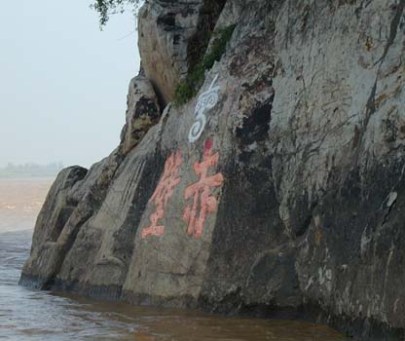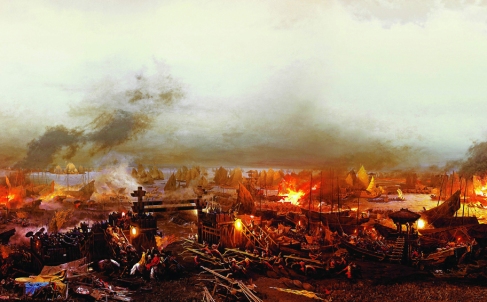Su Shi, or Su Dongpo – who has been featured on this blog before, here and here – is known these days for being good at just about every civilised pursuit there was. As a politician in the turbulent years of the Northern Song Dynasty (960 − 1127), though, he often became the chew toy for the Imperial administration. Twice in his life he was caught up in court intrigues and exiled from the capital in 开封 Kaifeng (in modern day Henan) towards the south, first to modern day Hubei, and then all the way to Hainan.
Many of Su’s most famous works were written during these periods of exile, and the poem we are looking at today is one of them, dating from his exile to the prefecture of Huangzhou (in modern day Hubei). Its subject matter, though, is probably what’s most famous about the poem – the Battle of the Red Cliffs in 208 AD.
The Battle of the Red Cliffs was one of the critical battles which led to the opening of the equally famous Three Kingdoms Period (220 − 280 AD); it is seen as so central in the novel Romance of the Three Kingdoms that its run-up and eventual resolution takes up 8 chapters, and is the arguable climax, in a 120-chapter book. 曹操 Cao Cao (155 − 220), having united the north of China, led hundreds of thousands of men south in a attempt to unite the whole thing; but at the Red Cliffs, he was stopped by an alliance between 孙权 Sun Quan (182 − 252) and 刘备 Liu Bei (161 − 223), who managed to set fire to his whole fleet with a clever ruse.
Famous as the battle is, though, there remains much debate about where exactly the battle was. The picture above, with the words ‘Red Cliff’ carved into the rock, is not the same place where Su Dongpo was when he composed this poem; Su’s guess as to the battle’s location was near his site of exile in Huangzhou, a long way to the northeast. Nonetheless, as with so many ancient battles, it’s the thought – or in this case, the historically famous piece of literature – that counts.
Poem
大江东去,浪淘尽,
The Great River [1] flows east, and borne on its waves
千古风流人物。
Are all the great men of centuries past.
故垒西边,人道是,
To the west of the old fort, people say,
三国周朗赤壁。
Are the Red Cliffs of Zhou Yu [2] from the Three Kingdoms.
乱石穿天,惊涛拍岸,
The rocks pierce the air, waves shatter on the shore,
卷起千堆雪。
Mounting great banks like driven snow.
江山如画,一时多少豪杰。
A landscape like a painting, and once so frequented by heroes!
遥想公瑾当年,
To imagine Gongjin [3] in those distant days,
小乔初嫁了,雄姿英发。
Newly married to the younger Qiao [4], at the height of his beauty and vigour.
羽扇纶巾,谈笑间,
Feather fan in hand, and scarf on his head, he chats and laughs,
樯橹灰飞烟灭。
As masts and rudders [5] are rendered to ash and smoke.
故国神游,多情应笑我,
So much for imagining old kingdoms, that my laughable sentimentality
早生华发。
Has whitened my hair before its time.
人生如梦,一尊还酹江月。
A life like a dream – now I shall dream of toasting the river moon!
1 – That would be the Yangtze River. Which, as we know, is pretty big indeed.
2 – 周瑜 Zhou Yu (175 − 210) was the supreme commander of Sun Quan’s forces. While later works like the Romance of the Three Kingdoms emphasise, for political reasons, that the famous 诸葛亮 Zhuge Liang (181 − 234) was the one who won the battle, during Su’s time credit went correctly to Zhou. In here he is called something like ‘Zhou the Attendant’, because he was appointed as Attendant General in the past.
3 – 公瑾 Gongjin – Zhou Yu’s [courtesy name]. Both Yu and Jin are ritual tools made out of jade.
4 – Younger Qiao – this refers to two sisters who were both famed beauties in the south of China, known simply as the Elder and Younger Qiao. Since Zhou Yu and his best buddy 孙策 Sun Ce (175 − 200) were both known as handsome and talented men as well, they eventually married the two sisters, Zhou marrying the younger Qiao.
5 – Masts and rudders – here referring to Cao Cao’s massive invasion fleet.


Pingback: Vacant Mountain 空山 | An Explanation of ‘Lyrics to the form of _______’, along with three translations of 忆江南 ‘Remembering the South’